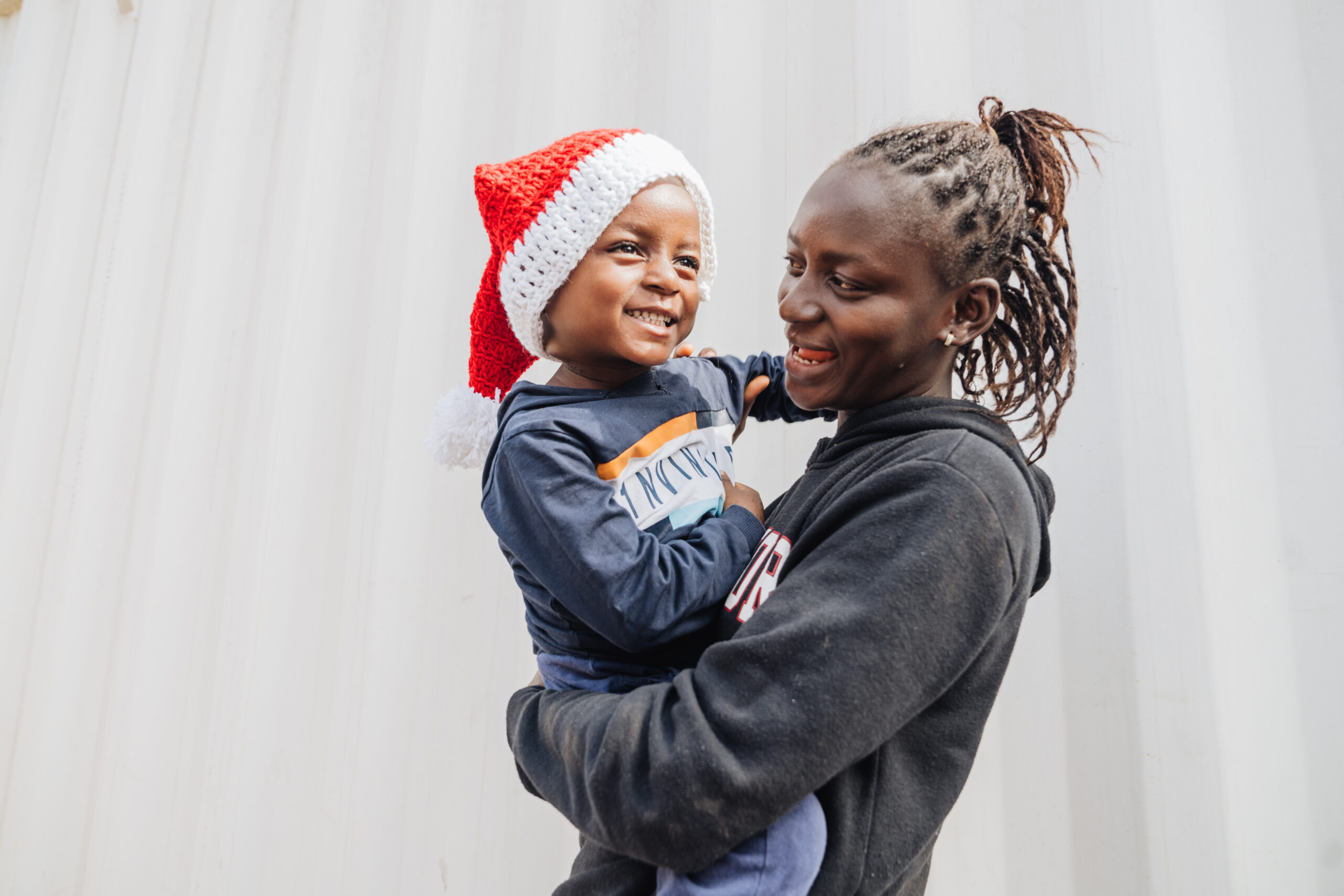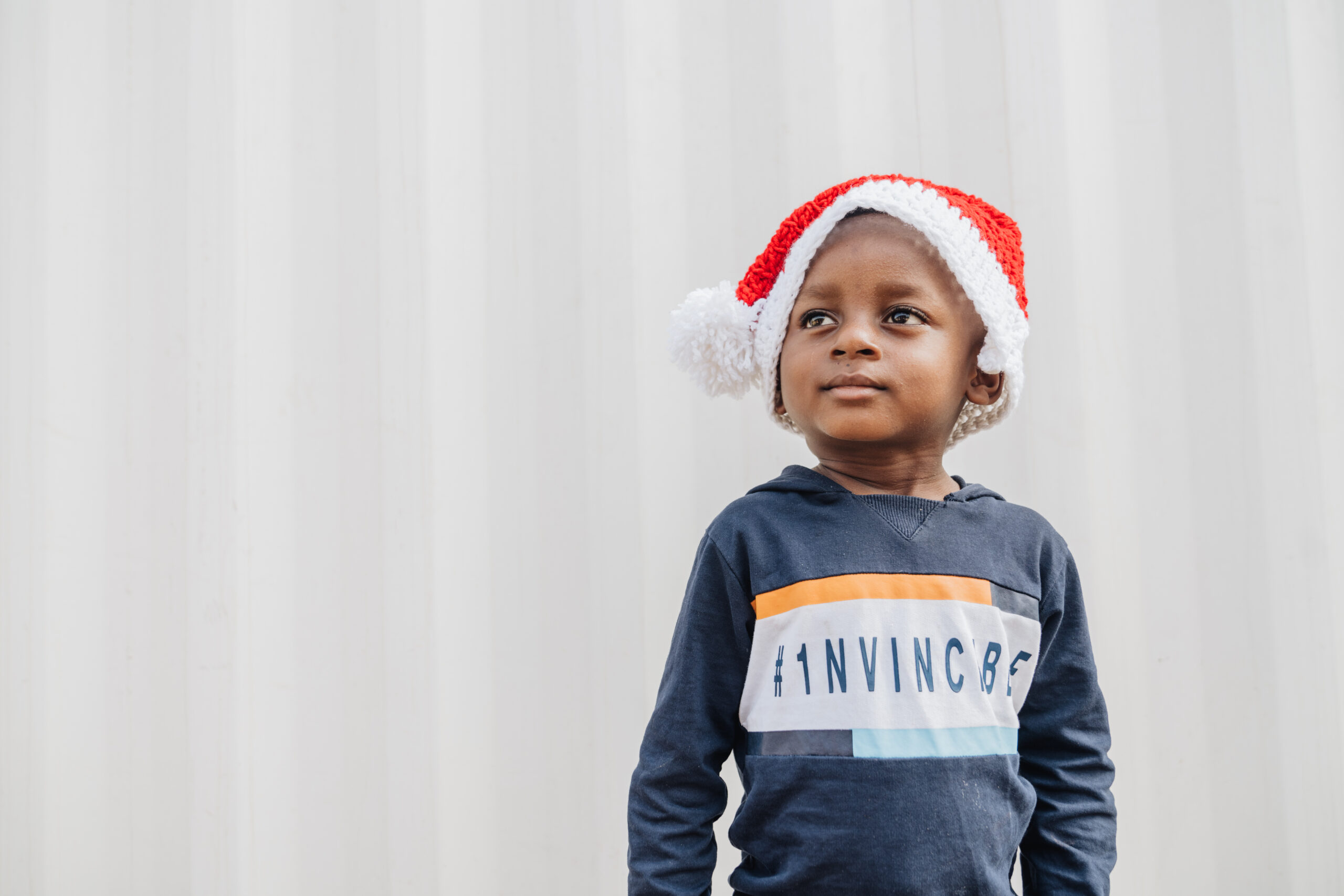The Greatest Gift: Hope for Emmanuel

Emmanuel, 3, was diagnosed with lymphangioma, a rare disorder that received treatment on the Global Mercy™ in Freetown, Sierra Leone.
Manteneh was a nearly defeated woman when she brought her 3-year-old son, Emmanuel, to Mercy Ships. She told doctors on the Global Mercy™ that several local hospitals in Freetown simply did not know what they could do to treat Emmanuel’s rare disorder, lymphangioma, so they turned her away. For Manteneh, Mercy Ships was their last chance.
She explained how this all began. Shortly after her son was born, she noticed a white-colored swelling around his ear. Unsure of what to do, she compressed the area with warm water, but things began to worsen.
“The area later turned into a sore, so I stopped washing it,” Manteneh said. “We went to so many local hospitals and clinics, but they sent us home.”
Emmanuel was later diagnosed with lymphangioma, an abnormality of the lymphatic system that occurs during pregnancy, often not apparent until after the child is born. While rare, these cases account for 4% of all vascular tumors in children, most of them becoming evident by 2 years of age.
In Emmanuel’s case, the lesion developed on the side of his face, near his ear, and many doctors at local hospitals could not treat him beyond prescribing basic pain medication.
Emmanuel’s family came to the hospital ship like so many others, after having heard a public service announcement about the Global Mercy and its gift of free surgical care.
“I learned about Mercy Ships from my brother-in-law who suggested we go to Freetown to register Emmanuel to see a surgeon. I didn’t know if it would work, but this was our last chance,” Manteneh explained.
While Emmanuel shared that he was in pain, his joy outshone any discomfort as he giggled in his father’s arms in the Mercy Ships patient waiting room. Although timid with other strangers at first, his connection to his father was clear, and his father did everything to stay calm and ensure Emmanuel wasn’t afraid or nervous. His mother, still nervous about the fate of her child before surgery, sat slouched, fatigued from their ongoing ordeal.
A Final Hope
Emmanuel’s condition forced his father, a student at the University of Makeni, and his mother, a tailor, to stop working to fully care for him, leaving them still struggling to earn an income. Sierra Leone’s economy faces challenges like high unemployment rates and staggering inflation, with the average base wage falling between 600-1000SLE ($27-43 USD) per month. In these conditions, families often cannot afford basic medical care, much less treatment for rare conditions like Emmanuel’s.
But even when treatments are affordable, many patients simply cannot find a specialist in the rural parts of the country to see them. This forces families to seek assistance in the country’s main urban area, often far from their homes, where most medical NGOs like Mercy Ships can offer care. The costs of transportation, housing, and food are often higher in Freetown, adding further obstacles to receiving affordable healthcare.
Emmanuel and his family relocated to Freetown in July 2023, living with friends and relatives temporarily so they could be closer to the Global Mercy for their son’s appointments. For others without the financial means or family connections in Freetown, getting advanced medical care can be an uphill battle. In Sierra Leone, it is often incredibly difficult to access this kind of medical care in a fast and affordable way for everyone. For countries it serves, Mercy Ships is a force multiplier, serving as an additional resource that eases the strain on countries’ surgical care systems while running education, training, and advocacy programs designed to equip and empower national healthcare professionals long-term.
“There are significant barriers for patients with these kinds of conditions. On top of the financial costs of travel and paying for surgical and post-op care, the lack of availability of medication, and access to surgeon specialists makes it nearly impossible for patients like Emmanuel to find care,” explained Mollie Felder, a volunteer maxillofacial nurse on the Global Mercy. “There are no maxillofacial surgeons in Sierra Leone, and only one pediatric surgeon.”
While uncommon and noncancerous, Emmanuel's lymphangioma developed into a large lump, putting other organs and tissue at risk while disfiguring the shape of his head.
“If the mass continued to grow, it could press on more of the surrounding areas, potentially causing problems such as facial nerve compression, which would affect the way he is able to move his face, and even cause facial disfigurement,” added Mollie.
For Emmanuel’s family, like many others facing similar challenges, the effects went beyond the physical.
“[Finding access to adequate healthcare] caused emotional strain on his mother, as well as the child, in part due to stigmas and discrimination surrounding such visible differences and lack of knowledge as to the cause of these anomalies,” said Mollie. “If he would continue to experience social isolation due to his condition, it could affect his development given his young age.”
While a stoic and quiet child, Emmanuel smiled through the affliction. He was too young to fully understand the effect this would have on his social upbringing – but his mother was already experiencing it.
“Sometimes I get ashamed when people see him and start asking me, ‘Is that a boil? What's the problem? Why is his jaw like this?’,” Manteneh said, saddened. “I do get embarrassed.”
Similar cases have seen patients facing judgement by their family or peers, and when the ailment affects a small child, shame is often cast toward a mother’s ability to parent.
The Greatest Gift on the Global Mercy
Emmanuel’s doctors on the Global Mercy planned to remove his facial lump in a maxillofacial surgery, requiring at least two visits for injections that would harden his growth and better prepare it for surgical removal. After several visits, Emmanuel was ready for surgical intervention, while his parents waited anxiously.
“I was so worried for him. After they took him away for surgery, I couldn’t eat any food,” his father, Yirah, said.
Hours later, he returned from a successful surgery with a swollen, wrapped face. Emmanuel maintained his peace coming out of his operation, hugging his father, returning almost immediately to playing with kids, and setting the bedtime hours among other patients by quietly leaving in the middle of play to rest.
“When Emmanuel got up to go to bed, all the other kids knew it was bedtime. Emmanuel didn’t have to say a thing,” said Nicole Stoffels-Quebe, volunteer ward nurse on the Global Mercy. “He was a silent leader.”
After things calmed down, his father’s appetite returned, unburdened by the fate of his only son. “When he came back, I ate three plates of food,” his father said.
Over a period of days, Emmanuel’s post-operation swelling reduced, and he was ready to go home. While Emmanuel kicked a football around with other kids, his father was incredibly grateful for his son’s recovery.
“When he came home from surgery, it was like we had just given birth to Emmanuel,” Yirah said, smiling. “The entire community was very happy for my son’s surgery. People around us were saying that Emmanuel is a newborn baby!”
“We got treated like celebrities, camera everywhere. My son was treated like a president or minister, so I do appreciate everything,” he said.
At home, Emmanuel played with the neighborhood children as if nothing had ever changed, but his parents were in tears. They were overjoyed watching their son begin a normal life.
Neighbors gathered around Emmanuel, and his father led a song that he would sing with his son on the Global Mercy.
"I came with pain, I am going with joy, I came with pain, I am going with joy, Jesus has done it for me, Jesus has done it for me,Papa God has done it for me, Jesus has done it for me."


